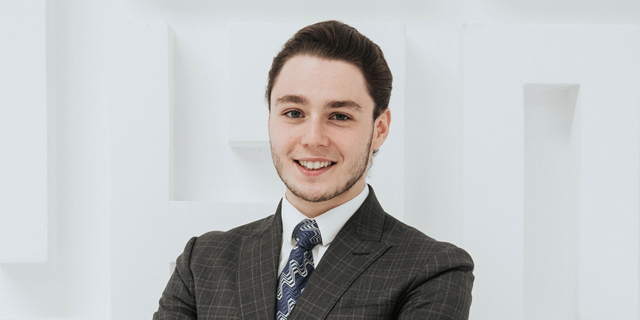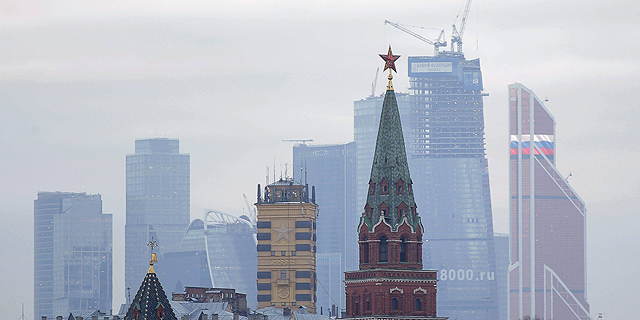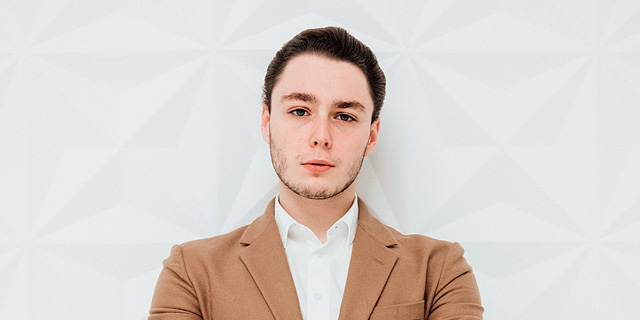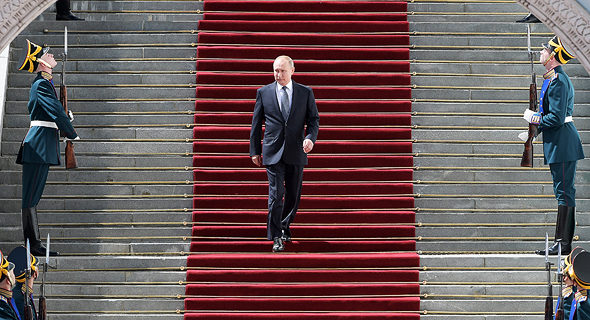
Interview
The Father, the Son, and the Wealthy Spirit
Alexander Fridman is not your typical 19-year-old. The son of Russian oligarch Mikhail Fridman, he recently started his third business and is hoping to make it on his own, with a little help from daddy’s contacts
Before January, nobody had heard of Alexander Fridman. This should come as no surprise, as 19-year-old men searching for their place in the world rarely pique the public’s interest. But, then, a short story published by Bloomberg turned Fridman into an international sensation. This is because Fridman is not your average young man but the son of Mikhail Fridman, one of Russia’s most prominent and well-known oligarchs, whose personal fortune is estimated at over $14 billion, according to Forbes.
Fridman was described in the story as the exact opposite of what you would expect from the son of one of Russia’s richest men: he was living in the outskirts of Moscow, in a rented apartment that cost $500 a month, and using public transportation to move around. “I eat, live, sleep, dress in everything that I earned myself,” Fridman told Bloomberg at the time.
“This wasn't a case of fake news,” Fridman told Calcalist in a recent phone interview while he, like the rest of us, remains at home due to self-isolation guidelines imposed due to the coronavirus (Covid-19) outbreak. Since the story came out, Fridman said, he has seen a bit of a boost in his business and decided to move to a slightly pricier apartment that is closer to his office at the Moscow International Business Center, also known as Moscow City. “I still take the underground metro everywhere,” he said. “I don’t even have a driver’s license or my own car.”
You may ask yourself what a billionaire's son is doing taking the metro to work but Fridman is not living the regular life of a rich kid. For one, he is not destined to inherit almost any of his father’s fortune as the latter already proclaimed he will be donating all of it to charity upon his death. In 2016, speaking in front of an audience at the Forbes club, Fridman Senior said giving a young person large amounts of money risks ruining their life and that he wants his children to follow in his footsteps and “create something of their own.”
"I was only 15 at the time, but it was not news to me,” Fridman said, explaining that his father always told him he would have to work for himself. “I have people around me that still make fun of me or feel sorry for me for not getting the money, but from an early age I knew some people would not like me, either because they were jealous of my money or my mind or because they were antisemitic,” he said.
At this point, we should take a minute to examine the history of Fridman’s father Mikhail. Fridman’s 56-year-old father is not just any billionaire, he is one of the seven original magnates who made their unimaginable fortunes during the crumbling of the Soviet Union. In other words, he is one of Russia’s original oligarchs.
In 1990, when Fridman Senior was in his twenties, he co-founded Alfa-Bank JSC, one of Russia’s first private commercial banks. In 1996, he officially became an oligarch when he was one of the seven businessmen that assured the reelection of then-Russian president Boris Yeltsin with a collective donation of $200 million to his campaign. In return, each of the newly crowned oligarchs got to acquire controlling stakes in Russia’s biggest strategic companies, thus establishing the infamous and unbreakable tie between Russia’s regime and its most wealthy individuals.
Fridman Senior acquired the controlling stake in state-owned oil company TNK for several hundreds of millions of dollars together with businessmen Len Blavatnik and Viktor Vekselberg. In 2013, the three sold the company back to Russian state-owned energy group Rosneft Oil Co. for $56 billion, raking in about $5 billion each.
Mikhail’s Alfa Bank is now a part of the Alfa Group Consortium, Russia's largest privately owned investment group.
Fridman Senior, now an Israeli citizen, is very much the last of the original oligarch group to still hold much of the fortune he acquired in the 1990s. He managed to retain his spot as one of Russia’s 10 richest people for many years, while the others fell from grace in various ways: Boris Berezovsky, for example, died in London in 2013 under suspicious circumstances; Mikhail Khodorkovsky was jailed in Russia for 11 years; and Vladimir Gusinsky, fleeing criminal charges, had to leave his homeland, immigrating to Israel at one point.
In recent years, Mikhail Fridman has been residing in a mansion at the edge of London’s Hampstead Heath, which he acquired in 2016 for GBP 65 million (approximately $86 million, at the time), making him London’s wealthiest resident. This fact could perhaps provide a better perspective on Fridman Junior’s claims of financial independence and forfeiture of wealth. Fridman may not stand to inherit much and indeed needs to work for a living but his familial ties remain a huge advantage for him.
As a child, Fridman only saw his father once or twice a week, because “he was working all of the time.” Fridman said he was once angry at his father for not being there but now believes the quality of the time they spent together meant more than the quantity. “In the mornings, before I left for school, we would talk about his business, about other companies, and about the news, for an hour or so,” he said. “In my work, I now encounter situations my father told me about as a kid and I appreciate it,” he said.
One of the few questions Fridman is reluctant to answer is the number of siblings he has. This is a question for his father, he said. According to most reports, in addition to Alexander, Fridman Senior has three daughters, two from a previous marriage, but some reports claim he has additional offspring.
Mikhail's efforts to teach his son the value of a dollar from an early age may seem almost absurd. While his schoolmates in Moscow were driven to school in Mercedeses and Hummers, accompanied by bodyguards and loaded with cash, Alexander Fridman walked to school alone with a sandwich in his backpack. When he was 12 and wanted to take a girl from school out on a date, he was sent to earn the required cash. His father gave him two options: washing the family car or memorizing a poem. Each task would earn the young Fridman $2, but since the girl he was interested in was herself an oligarch’s daughter, to pay for the restaurant she wanted to go to, Fridman would have had to “wash all the cars in Alfa Bank’s parking lot.”
On another occasion, Fridman acted more like a typical rich kid when he lost an iPhone to a classmate on a bet. His father agreed to pay for the device he owed so he could keep his word, but Fridman had to memorize and recite 70 classical poems to pay it off.
With time, Fridman developed a better eye for business and realized going to a prestigious rich-kid school spelled opportunity. “As early as the third grade when I got cookies and chocolate in my lunch box, I would sell them to other kids, especially those whose parents were strict about a healthy diet and would not let them have sweets,” he said. Later, he started selling overpriced snacks and alcoholic beverages to older students. “These kids don’t know the real price of things, for them, it’s just a few more pieces of paper so I could charge them twice or three times the regular retail price,” he explained.
What Fridman refers to here as “just a few more pieces of paper” is, in fact, equivalent to half the average monthly wage in Russia. According to Fridman, he used to get the alcoholic beverages from his mother’s personal driver and would then store them in lockers at the school’s swimming pool and sell the codes that unlocked the goods.
Speaking of business training, another skill Fridman learned at a young age was how to launder the money he made, as he could hardly tell his parents where it came from. “I bought some PlayStation games but most of the money I just buried in the yard,” he said.
Fridman said he always knew he wanted to be a businessman but his father wanted him to be an intellectual. Fridman is aware of the fact that an opportunity like his father got when the Soviet Union fell apart is unlikely to fall in his lap but believes “a fortune can be made at any time.” According to Fridman, money is a sign of success but he does not plan to spend it on expensive toys or property. “I want to be free of these worries.”
At 13, Fridman was sent to Sevenoaks School, a private boarding school in Kent, which charges about GBP 40,000 (approximately $50,000) in annual tuition. He studied alongside the sons of fellow oligarchs, British lords, and one Bollywood star. Fridman spoke of his time at the school as character-building and said the experiences there taught him to toughen up and deal with being picked on. “I never imagined I would get in fights in the U.K. for being Jewish,” he said. “As a boy, I used to weigh 120 kilograms on top of being Jewish so I was pretty used to being picked on,” he said. “My father always told me I could lose the weight, but I will always be seen as a Jew.”
When he was living in the U.K., Fridman still had to make some money on the side for anything more than the basic stipend his father gave him. His friends, the son and daughter of Russian billionaire Oleg Tinkov, used to lend him money for Uber rides and cinema tickets.
That is how Fridman’s current business activity was born—from a mix of independent thinking and daddy’s connections. “It is hard to separate between his connections and mine,” he said. “He has his own connections at work but the rich kids I met at the school he sent me to—are they his connections or my own?” According to Fridman, these connections only serve as a good starting off point. “They got my foot through the door and I am now in the lobby, but I want to climb to the top of the tower,” he said.
To get there, Fridman started his first business at 18, organizing and producing glamorous parties for the rich and powerful, namely the offspring of oligarchs he knew from school. Fridman got the best bands and DJs for these parties but said he quickly learned this type of business can be questionable and has a lot of dirty money that made him feel uncomfortable.
With the money he made producing parties, Fridman moved on to the next big thing: hookahs or as they are known in Russia: steam cocktails. With this branding, Fridman was able to offer his product at Moscow’s top luxury restaurants, charging an unbelievable fee of $200 for smoking it. Of course, it did not hurt that most of these restaurants were owned by people in Fridman’s social circle.
At this point, Fridman realized he could use his connections to form a more serious business and so he founded SF Development. SF is short for Six Figures, he said. “We started out as six partners but this has more to do with our goal, which is to make $1 million in our first year,” he said. SF offers an accelerator program for small companies that is based on a partnership with the elder Fridman’s retail business. “We take companies with interesting products or back-office solutions and get them into retail,” Fridman said.
“We found a company that developed a good solution for customer club management and we put it in touch with some retail chains that would normally not work with such a tiny company,” Fridman said. According to Fridman, he uses his father’s connections to give companies a leg up. “The main concept is that companies come to us with innovative products and our experts teach them what they need to know about marketing, business, and logistics and then connect them with large chains,” he said.
According to Fridman, there is no nepotism here. “My last name opens doors for me and I have contacts inside my father’s chains, but they still would not take any product from me if it doesn’t make them money,” he said.
The first products SF put on the shelves of Russian stores and which already bring in several hundreds of thousands of dollars in annual revenue are a chewing gum brand from Turkey called Love Is and a South Korean soft drink called Morning Care that supposedly reduces the ill effects of a hangover.
Fridman Senior’s retail business X5 Retail Group NV is the largest retailer in Russia with a chain of 15,000 neighborhood supermarkets, 850 hypermarket stores, and 90 Walmart-like mega stores. In 2019, its sales amounted to $23 billion and it is traded on the London Stock Exchange at a market capitalization of about $8 billion. As it is responsible for 12% of Russia’s food industry, any chewing gum that reaches X5’s shelves is up for a significant boost.
In Russia, everything is new money, and people are flaunting it and wasting it, unlike in the U.K. where they have traditions of wealth being passed on throughout the generations, Fridman said. Referring to the problematic reputation of Russia’s billionaires, with many suspected of illegal activity as the country stands high on corruption rankings, Fridman said what is required is a complete political and legal transformation. “As long as people cannot become rich through honest work, Russian businesses are going to be treated with suspicion,” he said. “I can do everything legally and pay whatever taxes I am required to, but it will take many more years for Russia to gain this trust,” he added.
In Russia, as Fridman puts it well, everything is political, even Covid-19, which has had an ill effect on his new business over the past two months. Russia tried, for a long time, to deny there has been an outbreak in the country, but at some point, the number of dead could not be written off as a result of seasonal pneumonia. Now, when most of the world has already succeeded in flattening the curve, Russia is still in the outbreak’s peak and was, as of early May, seventh in the world in terms of the number of confirmed patients, amounting to some 220,000, including Prime Minister Mikhail Mishustin.
Even when President Vladimir Putin decided to look reality in the eye and enforce lockdown policies, he refused to call them such, announcing a nationwide month-long “holiday” in which employers are expected to pay the workers’ full wages. However, many businesses reportedly continue to operate in secret for fear of financial collapse.
Putin has good cause to tread lightly, after, in mid-April, he conceded in the Russia-Saudi Arabia oil price war. Putin initiated this war hoping to hurt the American oil industry, but it ended up causing the ruble to drop. As 40% of Russia’s state budget comes from oil royalties, this crisis is expected to shrink Russia’s economy by 10% this year and 14% in 2021.
Putin also has a complicated political campaign ahead of him, also of his own making. On April 22, a referendum was scheduled to determine whether Putin can run for two additional terms as president, potentially retiring no earlier than 2036, which would require an amendment to the constitution. The vote on the referendum was postponed due to Covid-19 and, in the meantime, Putin’s popularity has sunk and he is looking at the very real possibility of having to retire in 2024. Now, he is attempting to distance himself as much as possible from the crisis, spending the lockdown in his summer home and hoping to emerge from the crisis with a strategy that can keep him at the helm.
Those hurt the most by the crisis are naturally Russia’s citizens. “The state is not effectively handling the coronavirus crisis,” Fridman said. “We are nearing the U.S. in terms of the number of patients but they have a much better healthcare system, he said, adding that Moscow’s hospitals are overcrowded and care in more distant areas is subpar.
Another issue in Russia is a lack of credible information. The number of reported coronavirus-related deaths is abnormally low. While the number of infected is similar to that of Germany, the number of reported deaths in Russia, around 2,000, is about five times lower than in the country that has one of the best healthcare systems in the world.
Fridman, like many others, is skeptical of the statistics coming from the regime. “There are significant political consequences to having many deaths and the numbers released are questionable,” Fridman said. He also believes politics is what is keeping Russia from declaring a state of national emergency. Should a state of emergency be declared, he said, Russia would need to spend money from its $120 billion National Wealth Fund and the government does not want to go there, especially considering the low oil prices, Fridman explained.
Fridman is well aware of the negative impact the oil wars will have on his business. With the ruble down, consumer spending is also likely to drop meaning products pushed by SF will find less of a clientele, he said. “It is becoming evident that the buying power of Russian consumers will be hurt by both the high unemployment rate due to coronavirus,” Fridman said, “and the extremely low government assistance budget, which is currently just 0.3% of the country’s gross domestic product.”
Fridman’s criticism of the regime may sound subtle but it is rare in Russia, especially coming from a member of a prominent oligarch’s family. When it comes to Putin, Fridman turns hesitant and his replies become less fluent, as he knows they could have severe implications not only on him but on his father as well.
It is no coincidence that Fridman Senior is one of the few oligarchs to stay at the top for over two decades. He is considered a shrewd and tough businessman and the bank he controls is one of the few in Russia that doesn’t dabble in debt restructuring processes. But, when it comes to public statements, Mikhail Fridman is extremely careful to walk a thin line. While in Russia he is seen as associated with Putin, he somehow managed not to be included among the Russian businessmen sanctioned by the U.S. in 2018, following reports of Russian intervention in the U.S. 2016 election. Two years ago, he was even invited to Washington D.C. to appear before international affairs think-tank the Atlantic Council and discuss the Russian economy in light of the new sanctions.
When the pandemic first broke in Russia, Fridman Senior addressed the country’s Jewish community with a reassuring message, claiming the crisis will be over in several months and necessary drugs and vaccines will be available within a year. Alfa Group also announced it will be donating 1 billion rubles (approximately $13 million) to fight off the virus. It feels like more than a coincidence that Mikhail Fridman’s optimistic message appears to be derived from Putin’s official party line.
Over the past few years, since he paid his debt to Putin by selling TNK back to the state, Fridman Senior is doing his best to distance himself from the Russian business world. In 2013 he founded LetterOne Holdings SA, a holding company incorporated in Luxembourg with offices in London and New York, that operates independently of the Alfa Group, which Fridman Senior reportedly attempted to sell in the past. Fridman Senior’s new interests have a more modern whiff and are focused mostly on tech, healthcare, and retail. Old habits, however, die hard and LetterOne’s most significant asset is German gas and oil company Wintershall Dea GmbH.
The Fridmans, both senior and junior, also have a connection to Israel where they have relatives. “I like the people in Israel and I feel like I have a lot in common with them in the way I think,” Fridman Junior said. “I also like the way of doing business in Israel but appreciate that since I haven’t lived there, I may not be aware of the negatives,” he added. “I haven’t tried to do business in Israel but that may be because I am still very young.”




